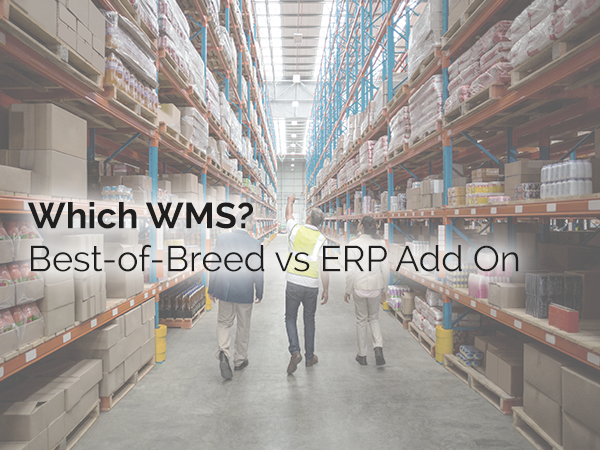Using a WMS is the obvious choice for any operation that’s serious about its warehousing and distribution. ERP vendors will tell you that their warehouse management add-on are all you need to run your operation. But is that really the case? Would a dedicated, best-of-breed WMS be better? Here’s our take on the best-of-breed versus ERP add-on debate for small and medium-sized businesses.
When to consider an ERP add-on
There are situations where it might be applicable to use the warehousing add-on or module that’s been developed by your ERP provider.
If you’re a very small distributor, with no plans for growth, then an ERP add-on is just fine. But even for warehousing operations with fewer than 10 operatives, using a dedicated WMS can improve your efficiency and profitability.
Your CFO might want to stick to using the same software as your ERP. It makes sense from the finance department’s point of view to use just one system. But, often that’s an unfounded assumption. You can ensure Finance gets the best ERP system, yet still integrate it with the best WMS for Operations. The systems may be made by different providers, but they will each be the best in their class and will be fully integratable. At Balloon, we integrate HighJump WMS with all manner of first-rate ERP systems, including SAP Business One, NetSuite, Sage and Microsoft Dynamics.
With ERP modules though, the functionality you need to run a successful warehousing operation just isn’t sufficient if you want to run a progressive, competitive business.
The benefits of best-of-breed WMS
The gap between an ERP warehouse add-on and a standalone WMS has closed over the past years. But it’s still wide enough that investing in a best-of-breed WMS solution offers the best functionality and performance for your operation.
An obvious function in a warehouse system is picking rules. A standalone WMS has countless different rules and picking methods that can be used, giving a high degree of flexibility. An ERP module is more limited. The more options you have, the better able you are to tailor how you set up your picking according to your own needs. If you’re restricted to using just a few methods, then you may not be getting the best productivity out of your workers. In which case, you won’t be picking as effectively as you could be. And you won’t be maximising your profits.
WMS solutions also have more advanced putaway logic. They can create user-defined rules that ensure better use of the available space. For example, a WMS can comingle products or segment stock across warehouse zones. But a standalone ERP warehouse module can typically only manage a single primary putaway location for each SKU.
Task management is far superior in best-of-breed WMS software too. Such systems have extensive task interleaving and work prioritisation capabilities. These reduce wasted moves in the warehouse and ensure that orders get out on time. In contrast, ERP warehouse add-ons have limited prioritisation functionality and no task interleaving.
Finally, ERP modules and add-ons don’t have the more advanced functionality that comes as standard within a best-of-breed WMS. Sophisticated features like dock scheduling, transport optimisation, or less than truckload (LTL) shipping integration can only be found in dedicated, best-of-breed WMS solutions.
WMS software is superior to standalone ERP warehouse add-ons
It’s clear that a specialist WMS can positively impact an operation. It can bring greater, reduced costs and results in efficiency improvements across the operation. Our own customers have been able to see a quick return on their investment in a dedicated WMS, and in the meantime, they have been able to benefit from speedier operations and enhanced accuracy.
If you’re still unsure about the benefits, let us show you. Call us on 020 8819 9071 or get in touch to arrange a demonstration.
